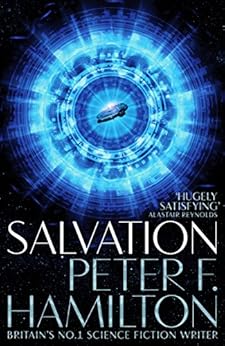 |
| Amazon link |
Fifty eight reviews already at Amazon at time of writing.
This, the first of another door-stopping trilogy, is a mid-future space opera set in a world structured by instantaneous transfer portals ('spatial entanglement' - nope, wouldn't work, should have stuck with wormholes).
Humankind has terraformed and colonised the planets around a number of the nearer stars (you still need a spacecraft to emplace that far gate). The Earth and most planets are dominated by the amoral-capitalist Connexion portal-monopoly ("one step away"), run as a benign despotism by its aged founder.
There is also a parallel civilization of planets and habitats run by the new communists, the Utopials with their gene-fixed gender-fluidity. Does this nod to contemporary identity-politics add any value? It's not clear.
And there are aliens. The religious ones in their arkship, making stopover in the solar system to top up their antimatter tanks while bestowing alien biotech in payment. They're on a trip to eternity to meet their final God. But are they as altruistic and well-meaning as they appear?
Then there are the other ones, who've inserted four humanoid agents into Earth's society. Why? In terms of the novel's characters who are they? Good or bad?
The central dynamic of the novel is the discovery of an unknown alien spacecraft which has crash landed on a newly discovered planet. The discovery team soon determine that the spacecraft contains unknown humans in hibernation pods. Were they abducted? Who are they? What does this mean?
A collection of top people from the various factions who really rule the human universe are sent in a luxurious land-cruiser to investigate, under top quarantine security. This is to prevent any alien incursion into the human datasphere. The journey takes several days which affords an opportunity - in the style of the Canterbury Tales - for each character to recount their back history.
What follows is a series of engaging short stories, techno-thrillers with plenty of mercenaries, espionage, terrorism, kidnappings and high-tech in the trade-mark Hamilton style. When they reach the spacecraft the plot twist kicks in, setting up the next volume.
There is a parallel storyline set hundreds of years in the further future. A group of adolescents is being trained as genetically-enhanced warriors to combat aliens which remorselessly hunt humans throughout the galaxy. Something bad has already happened in these people's past and they only dimly remember the characters we spend so much time with as 'Saints'. I agreed with those reviewers who assess this thread as the weakest part of the novel, lacking colour and intrinsic interest, with bland characters who do not really engage your interest.
After a slow start where one is continually trying to remember weird names devoid of context, the book picks up through the back stories, each of which is quite exciting. I'll certainly be looking at volume 2 when it arrives.
Other thoughts. There is plenty of homage to other works of science fiction. The future troops' training is straight out of Ender's Game; their warships have names like Morgan and McAuley; the house with rooms in different worlds is like the Hyperion Cantos.
I'm appreciative of Hamilton's political skepticism. He doesn't like ideologies, seeing them as weapons against actually-existing humanity. His Utopials, exemplifying politically-correct liberalism, are creepily self-righteous and rather repulsive. Is there a broader message here, some zeitgeist-concern which Hamilton is seeking to address?
In an interview with SyFyWire, Hamilton said, "To some degree it's about the level of trust and mistrust that's developing in the the political arena, with everyone suspicious of anyone who isn't on their side. I managed to blend that paranoia with a whodunnit as five people from different factions embark on a trip together ."
---
Here's an extract from the Kirkus review:
"Early in the 23rd century, when a wrecked alien ship turns up on a remote planet, the all-powerful Connexion Corp, which provides instantaneous travel via quantum-entangled, step-through portals, organizes a team to investigate: security chief Feriton Kayne; Connexion bigwig Yuri Alster; Callum Hepburn, who works for the Utopials, an independent human civilization; Alik Monday, an FBI operative from Corporate Earth; and various assistants.---
What’s aboard the alien vessel proves both difficult to fathom and extremely unnerving. The actual investigation moves at glacial speed, though, interspersed as it is with backstories involving team members plus chapters in an independent thread set in the far future, where child soldiers train to meet a mysterious and all-conquering alien enemy.
In the present, meanwhile, we hear about two sets of aliens. The nonhuman Olyix have stopped off at Earth to refuel on their endless voyage across the universe, where, at the end of time, they expect to meet their god; they seem benevolent, but not everyone agrees. The Neána, whom readers know about but none of the characters may, arrived secretly some years ago, grew some human bodies, and sent them out to do—what?
So, readers will contend with a choppy narrative, obvious delays and sidebars, and long stretches that read like an editor’s advice to a first novelist on how not to introduce your characters or propel the storyline and veer dangerously close to dull. It’s a yarn, however, that packs a teeth-rattling wallop when it finally gets there."
No comments:
Post a Comment
Comments are moderated. Keep it polite and no gratuitous links to your business website - we're not a billboard here.